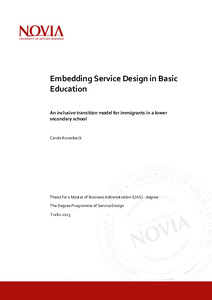Embedding Service Design in Basic Education: an inclusive transition model for immigrants in a lower secondary school
Rosenback, Carola (2023)
Rosenback, Carola
2023
Julkaisun pysyvä osoite on
https://urn.fi/URN:NBN:fi:amk-2023060117213
https://urn.fi/URN:NBN:fi:amk-2023060117213
Tiivistelmä
This thesis paper explored how service design thinking could support development work in basic education when developing a new teaching model. Since many immigrant pupils might come to Finland in the middle or final stages of their basic education, language is an obstacle for learning. Therefore, focus lied on language barriers in this thesis, as well as identifying other factors that affect the teaching and learning environment.
The work was done in the context of the Finnish National Agency for Education funded project "Successful inclusion at the transition stage from teaching that prepares for basic education into a regular class” in a lower secondary school in the Ostrobothnia region. The project resulted in identification of challenges in education, a new teaching model, a teaching platform for educators and pupil personas. The upcoming school year will see ongoing work and implementation of the new model.
Throughout the project journey, service design methods and tools such as observations, cultural probes, Delphi survey, and usability-testing were examined in relation to the project goal. Service design methods were explored with both pupil- and teacher faced methods to identify the needs in education. It was an important starting point to look after the needs of both pupils and teachers, in order to develop a model that is beneficial to everyone.
The project reveals that there are other elements of learning than just language that are equally crucial to success in school, such as motivation, study techniques and home-school interaction. To provide an inclusive learning environment and ensure that immigrants can successfully integrate into regular classes, all of these elements need to be examined.
The work was done in the context of the Finnish National Agency for Education funded project "Successful inclusion at the transition stage from teaching that prepares for basic education into a regular class” in a lower secondary school in the Ostrobothnia region. The project resulted in identification of challenges in education, a new teaching model, a teaching platform for educators and pupil personas. The upcoming school year will see ongoing work and implementation of the new model.
Throughout the project journey, service design methods and tools such as observations, cultural probes, Delphi survey, and usability-testing were examined in relation to the project goal. Service design methods were explored with both pupil- and teacher faced methods to identify the needs in education. It was an important starting point to look after the needs of both pupils and teachers, in order to develop a model that is beneficial to everyone.
The project reveals that there are other elements of learning than just language that are equally crucial to success in school, such as motivation, study techniques and home-school interaction. To provide an inclusive learning environment and ensure that immigrants can successfully integrate into regular classes, all of these elements need to be examined.
